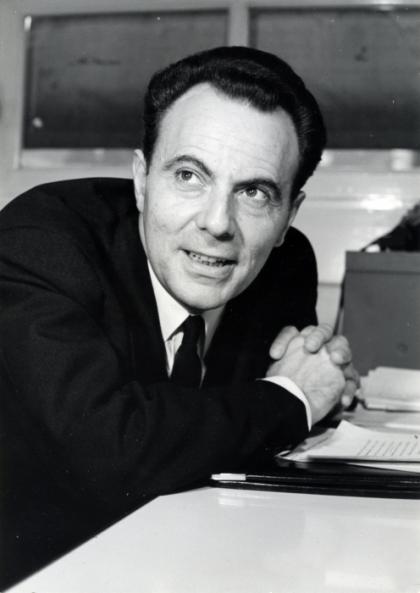
François Jacob is not only a scientist at heart, but also a firm believer in the progress of science and a committed, passionate, and profound humanist.
François Jacob’s original vocation was surgery and he began his medical studies in Paris, which were soon interrupted by the war. He then left France in June of 1940 and joined the Free French Forces in London, serving in the French Army Health Service in military operations nearest the combat zones and sustaining wounds in Normandy in 1944.
After the war he finished medical school but his injury forced him to give up surgery. In 1950, he turned to biology and joined André Lwoff's laboratory at the Institut Pasteur. In 1960, he was appointed Head of Cellular Genetics. He first worked with Elie Wollmann on transfer mechanisms for genetic material between bacteria and the silencing mechanisms of prophages within bacteria. François Jacob then recognized the parallel between this work and the lactose system that Jacques Monod was working on.
Beyond the discovery of the gene regulation systems in bacteria, he established, with Jacques Monod, further foundational notions of contemporary molecular biology, notably that of the existence of messenger RNA and the allosteric regulation of proteins. François Jacob was a member of the Académie française, recipient of the Grand Croix de la Légion d’Honneur, and has been Chancelier de l’ordre de la Libération (2007-2013).
"… Every one of us dreamed of changing the world at twenty. Every one of us knows that s(h)e won’t do it at the age of forty. At best and with a little luck we can hope to contribute in some way to the stock of truths, recipes and ideas that human beings have been slowly but surely accumulating over time. In my view, that is the meaning that Alfred Nobel wished to give the prizes he created. Yet a scientist is plagued with contradictions that lie at the very source of all research."
The spotlight under which your decision places him and his work can only embarrass, delight and yet frighten him all at once.
Embarrass him because he measures the extent to which such a distinction exceeds his personal merits and reaches out to all science and those that contribute to its progress.
Delight him because, despite his modesty, he feels the need to be recognized and for his work to receive the most solemn of distinctions. Frighten him too because the official character of this recognition is out of step with the doubt and the worry needed for the task that he aims to continue. " We never seek things, said Pascal, but for the search of things… "
"Through their objective critique and independent spirit the Nobel Committees have succeeded in bestowing on the prizes they award a unique sense of prestige. And if on one day a year fundamental science is seen to emerge from its cocoon of obscurity, if its role in our evolution and our culture is accepted by all today, and if the powers that be grant research their support each day, it is largely thanks to the way in which you have interpreted and fulfilled the wish of Alfred Nobel…"
Extract of François Jacob’s Nobel Prize speech
December 10, 1965
© The Nobel Foundation 1965


